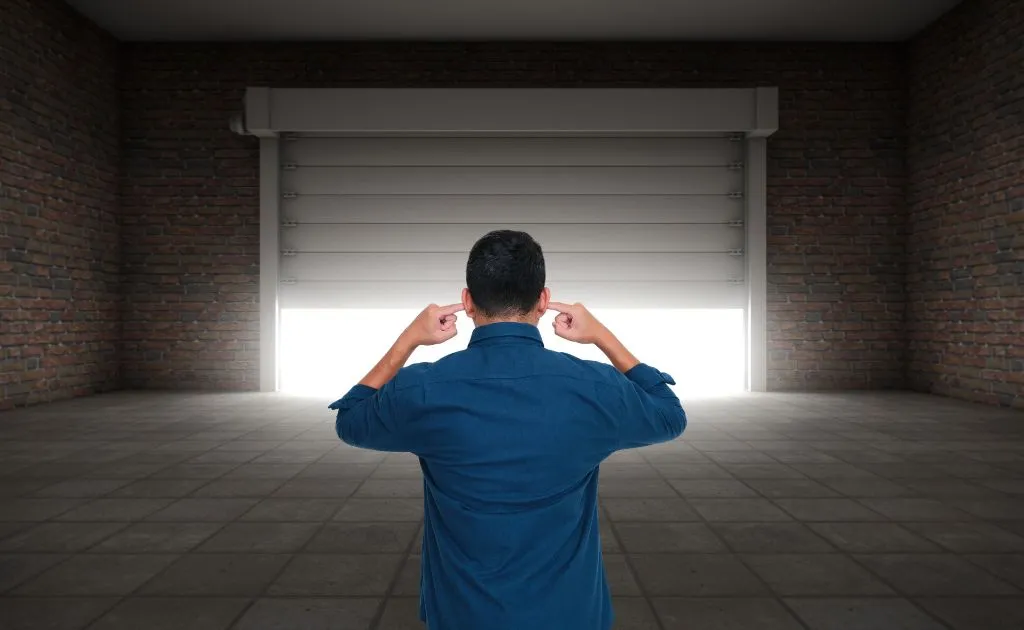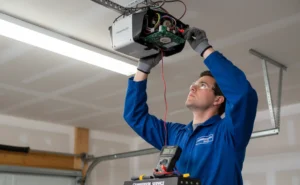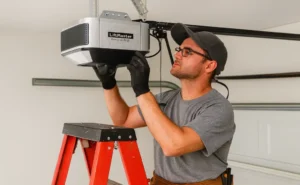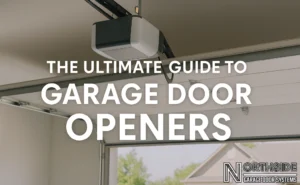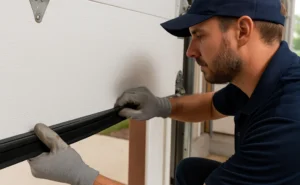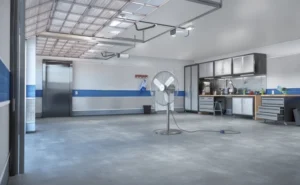A noisy garage door can be more than just a minor annoyance; it’s often a sign that something isn’t working properly. Garage doors are complex systems with many moving parts, and when they start to make unusual sounds, it’s important to pay attention. Whether it’s a grinding, squeaking, or rattling sound, garage door noise can signal various underlying issues.
Today, we’ll take a close look at why a noisy garage door becomes a problem, the common causes behind the noise, and how you can fix it. Understanding the reasons for garage door noise is the first step toward solving the issue and restoring peace and quiet to your home. We’ll also discuss preventive maintenance tips to help keep your garage door operating smoothly.
By the end, you’ll have a clear understanding of the different causes of garage door noise and know exactly how to address them, whether through DIY solutions or by calling in a professional.
A noisy garage door can make a variety of sounds, each of which may point to a specific problem. Understanding the type of noise your garage door is making is important in order to identify the cause. The most common noises include grinding, squeaking, rattling, and banging, all of which are signs that something may be wrong with the system.
Grinding noises typically occur when the metal components of your garage door are rubbing against each other due to a lack of lubrication or alignment issues. Squeaking, on the other hand, is usually caused by worn-out or dry rollers that need oiling. A rattling noise often indicates loose nuts, bolts, or other hardware, while a banging sound could mean the door is off-balance or there’s a problem with the springs.
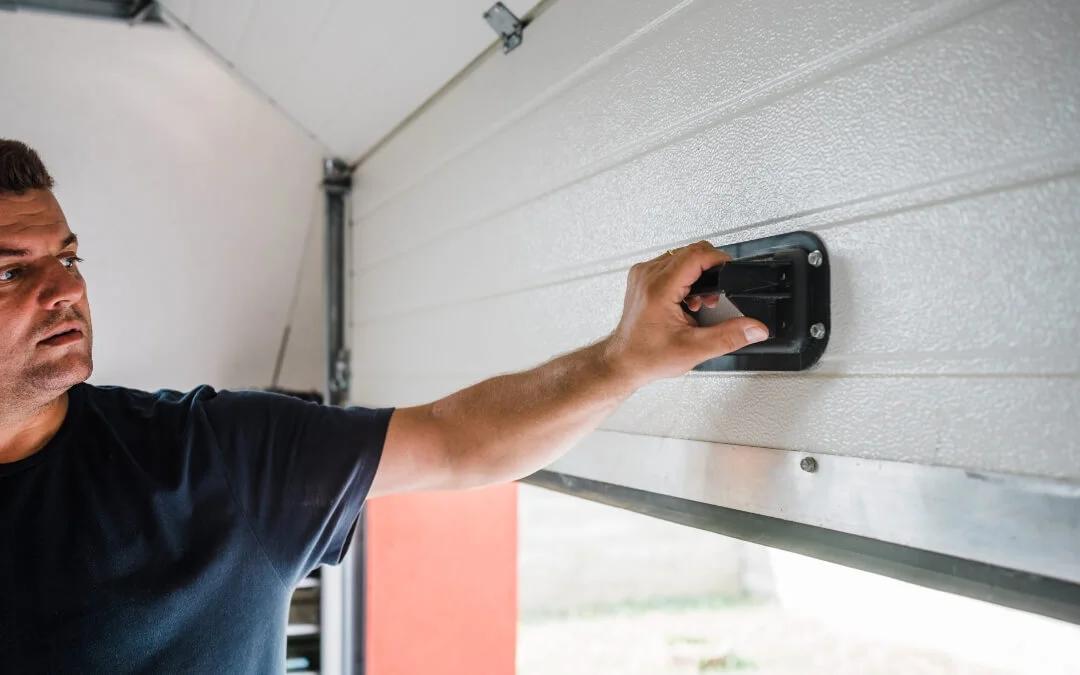
These garage door sound issues are not only irritating but can also signal underlying mechanical problems that need attention. For example, if your door makes a grinding noise, it could lead to more severe damage if the components aren’t properly aligned. A loud garage door could also mean that the rollers are deteriorating, which can cause more significant damage over time if left unchecked.
Addressing these issues quickly can prevent bigger problems down the road. Whether the noise is a minor squeak or a more alarming rattle, it’s important to take action as soon as you notice it. Proper maintenance, lubrication, and tightening of loose parts can often fix many of these garage door sound issues. However, some problems, like damaged springs or misaligned tracks, may require professional attention.
By understanding the different sounds and what they mean, you can better diagnose what’s causing your noisy garage door and take the necessary steps to fix it before the problem worsens. Whether it’s a loud garage door or just an occasional squeak, addressing the issue early will save you time and money in the long run.
Common Causes of a Noisy Garage Door
There are several factors that contribute to a noisy garage door, and understanding these can help you address the issue effectively. The most common causes include worn-out garage door rollers, loose hardware, broken springs, misaligned tracks, and poor lubrication. Each of these problems not only creates noise but can also lead to further damage if not dealt with promptly. By pinpointing the exact cause, you can ensure your garage door operates smoothly and quietly.
1st Cause: Worn-Out Garage Door Rollers
One of the primary reasons for excessive noise from garage doors is worn-out garage door rollers. Rollers are essential for the smooth movement of your door along the tracks, but over time, they can become damaged or lose their efficiency. This is especially true for plastic rollers, which tend to wear out more quickly than metal ones.
As the rollers degrade, they create friction, leading to squeaking or grinding sounds. The problem becomes even more noticeable when the rollers are not lubricated, further increasing the noise. Replacing old or damaged rollers can significantly reduce noise and improve the overall function of the door.
2nd Cause: Loose Hardware and Components
Over time, the nuts, bolts, and hinges that hold your garage door system together can loosen, causing vibrations and rattling sounds. These loose garage door parts create a situation where the door vibrates more than it should, leading to noise every time it opens or closes.
Loose hinges can result in a creaking sound, while other loose components may cause the door to rattle. Regularly checking and tightening the hardware can help minimize this issue and prevent a noisy garage door from becoming a larger problem.
3rd Cause: Misaligned Tracks
When the tracks on either side of the garage door become bent or misaligned, the door may grind or scrape against them as it moves. This misalignment leads to a noisy garage door because the door is not moving as smoothly as it should.
In some cases, the garage door can become stuck or off-balance won’t fully close, further exacerbating the issue. Aligning the tracks properly, or replacing them if they are bent beyond repair, can reduce these grinding sounds and restore smooth operation to the door.
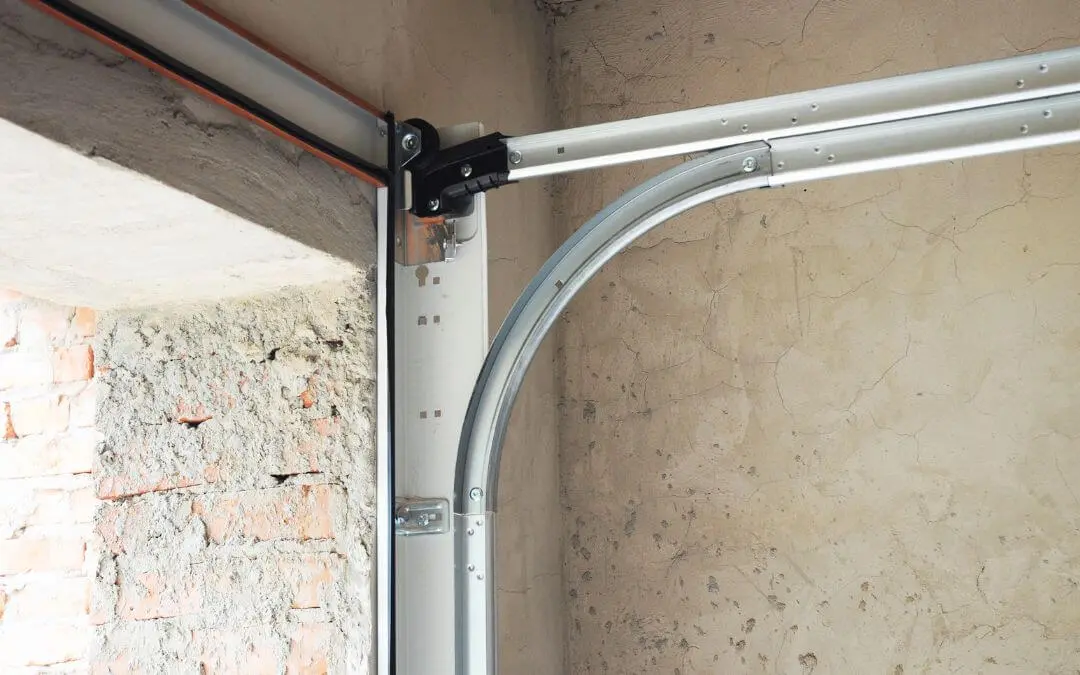
4th Cause: Poor Lubrication
A lack of lubrication is another common cause of a noisy garage door. The metal components, such as hinges, springs, and rollers, need regular lubrication to reduce friction and ensure smooth operation. Without proper lubrication, these parts can rub against each other, creating squeaks and groans that indicate a lack of maintenance. We have a guide on how to use lubricant on your garage door. You can read it, I hope it will be useful.
Applying a high-quality lubricant to all moving parts of the garage door system can often solve the noise problem and extend the life of the components. Keeping your door well-lubricated is a simple yet effective way to avoid unwanted sounds.
By identifying and addressing these common causes, you can prevent unnecessary wear and tear on your garage door system and reduce the noise it creates. Whether it’s replacing worn-out garage door rollers or tightening loose garage door parts, a little maintenance goes a long way in ensuring a quieter and more efficient garage door.
Quick DIY Fixes for a Noisy Garage Door
Fixing a loud or squeaky garage door doesn’t always require professional help. There are several simple DIY solutions you can try to address common causes of the noise, such as loose parts, worn-out rollers, or poor lubrication. With a few basic tools and a bit of time, you can significantly reduce the noise and improve the performance of your garage door. Below are some effective garage door repair tips that will help you tackle the issue.
Fix No. 1: Tightening Loose Hardware Parts
Loose nuts, bolts, and hinges are a frequent cause of garage door noise. Over time, the vibrations from regular use can cause hardware to loosen, leading to rattling or shaking sounds. To fix this, grab a wrench or socket set and carefully inspect the door for any loose components. Moreover, if you want to tighten your garage door chain, you can check out our guide, which is given here in detailed step-by-step form.
Check the hinges, brackets, and track supports, and tighten anything that feels loose. Be cautious not to overtighten, as this can strip the threads or damage the parts. By tightening these loose components, you can quickly eliminate unwanted sounds from your garage door.
Fix No. 2: Lubricating Garage Door Moving Parts (The Right Way)
One of the most common causes of a noisy garage door is friction between metal parts, which can lead to squeaking or grinding noises. Regular lubrication of all moving parts can significantly reduce the noise. Focus on lubricating the hinges, rollers, springs, and the tracks. Use a high-quality silicone-based lubricant or a garage door-specific spray.
Avoid using heavy oils or grease, as they can attract dirt and debris, causing more harm than good. Apply the lubricant sparingly to all moving parts, and be sure to wipe away any excess to prevent buildup. Lubrication is one of the easiest and most effective garage door repair tips to prevent further issues.
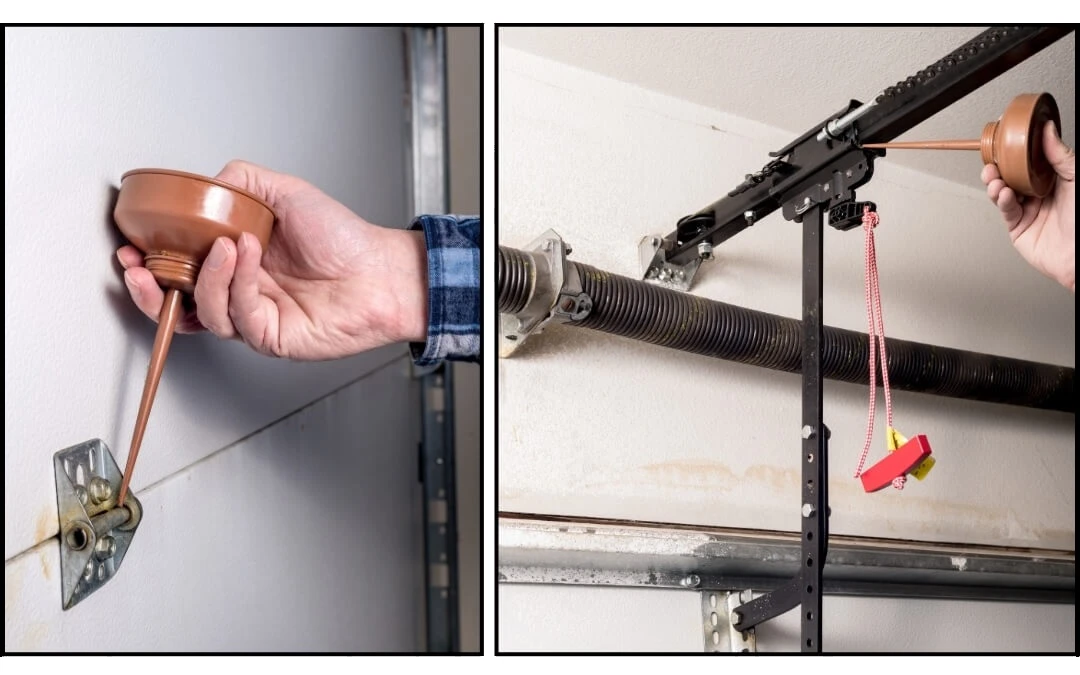
Fix No. 3: Upgrade Your Garage Door Rollers
Over time, garage door rollers can wear out, especially if they are made from plastic. Worn-out rollers can cause a noisy garage door due to the friction they create as they move along the tracks. If you’ve lubricated the rollers and the noise persists, it might be time to replace them. To do this, first, disconnect the garage door opener to ensure safety.
Then, carefully remove the brackets holding the rollers in place. Once the old rollers are out, replace them with high-quality nylon or metal rollers, which are more durable and quieter. Be sure to choose the correct size rollers for your specific door model. After replacing the rollers, test the door to ensure smooth and quiet operation. This is a more advanced DIY fix but is very effective in resolving noise issues.
Fix No. 4: Clean and Realigning Tracks
If your garage door makes a grinding or scraping sound, the tracks may be misaligned. Tracks can become bent or shifted over time, causing the door to rub against them, which can make the door noisy and harder to open or close. To realign the tracks, first, loosen the screws that hold the track in place.
Gently adjust the track until it is properly aligned with the door. Use a level to ensure that the track is perfectly vertical and aligned with the other track. Once adjusted, retighten the screws to hold the track in place. After realigning the tracks, test the door to ensure it moves smoothly. Proper alignment is essential for eliminating friction that leads to a noisy garage door.
By following these garage door repair tips, you can address the most common causes of excessive noise without needing to hire a professional. Regular maintenance, such as tightening loose parts, lubricating moving components, and replacing worn-out rollers, will not only reduce noise but also extend the life of your garage door. Remember, safety is key, so if you’re unsure about any repair, don’t hesitate to consult a professional.
Preventive Maintenance Tips
Preventive maintenance is key to preventing unwanted noise and ensuring your garage door operates smoothly for years to come. By staying on top of regular garage door maintenance, you can prevent many of the issues that lead to noise, such as loose parts, worn-out rollers, or inadequate lubrication. Here are some simple but effective tips that can help you keep your garage door quiet and functioning properly.
Tip 1: Regular Inspections
One of the easiest ways to prevent unwanted noise from your garage door is by conducting regular inspections. At least once a month, take a few minutes to visually inspect the entire garage door system. Look for any signs of wear and tear, such as frayed cables, loose bolts, or misaligned tracks.
Catching these issues early allows you to fix them before they escalate into more significant problems that could lead to noise. Additionally, testing the door’s balance and alignment regularly helps ensure it opens and closes smoothly without straining the components.
Tip 2: Lubrication Schedule
Proper garage door lubrication is one of the most important steps you can take to prevent noise. Without lubrication, the metal parts of the door, such as the rollers, springs, and hinges, can create friction, leading to squeaking or grinding sounds. To avoid this, establish a regular lubrication schedule, applying lubricant every 3 to 6 months.
Be sure to use a silicone-based lubricant designed for garage doors, as it is less likely to attract dust and dirt compared to grease. Simply apply a small amount to all moving parts, wipe away any excess, and you’ll help ensure quiet and smooth operation.
Tip 3: Tighten Loose Parts
Over time, the movement of the garage door can cause bolts, nuts, and screws to loosen, resulting in vibrations and noise. As part of your garage door maintenance routine, periodically check all the hardware to ensure it is secure. This includes inspecting the hinges, brackets, and tracks.
Tighten any loose parts with a wrench or screwdriver, but be careful not to overtighten, as this could strip the threads or damage the components. Keeping everything tight and secure will help prevent rattling and other noise issues.
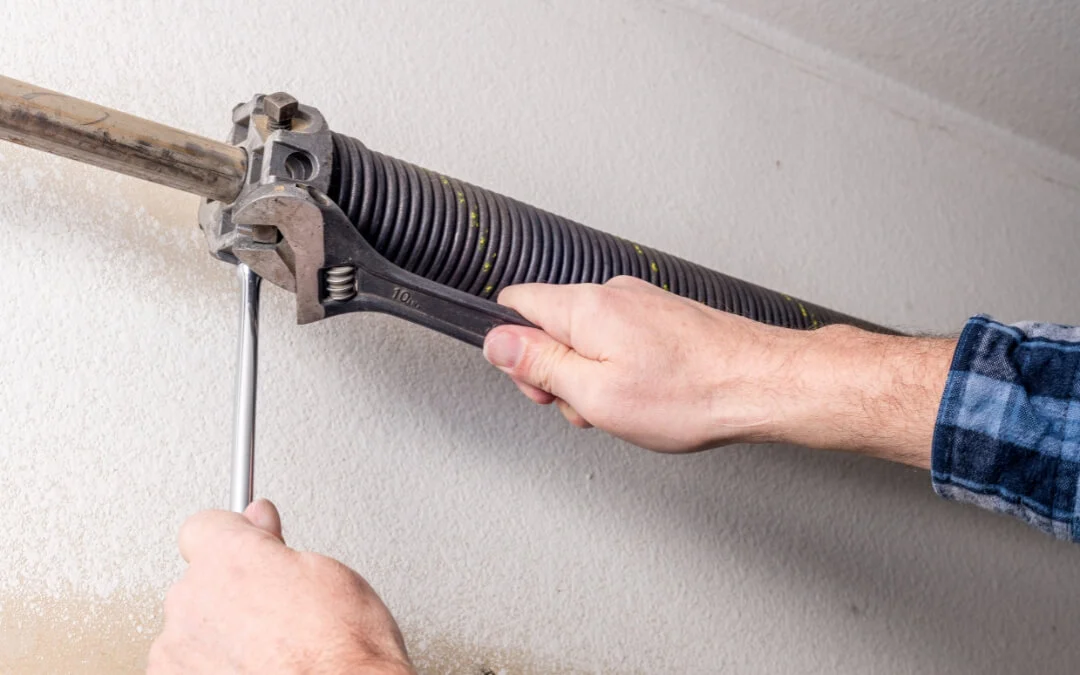
Tip 4: Check Rollers and Tracks
Your garage door rollers and tracks are critical for smooth and quiet operation. Rollers can wear out or become misaligned over time, leading to noise. As part of your maintenance routine, check the condition of the rollers and ensure the tracks are free of debris.
If the rollers are worn, consider replacing them with quieter nylon rollers, which tend to last longer and produce less noise than their metal counterparts. Make sure the tracks are aligned properly, and if they’re bent, adjust or replace them to prevent scraping sounds.
Tip 5: Test the Door Balance
A garage door that is out of balance can cause unnecessary strain on the opener and other components, leading to noise. To check if your door is balanced, disconnect the opener and manually open the door halfway. If it stays in place, it’s balanced. If it moves up or down, it’s out of balance, and you should contact a professional to adjust the springs. A balanced door operates more smoothly and quietly, reducing the chances of future noise problems.
Tip 6: Replace Worn-Out Parts
Even with regular garage door maintenance, certain parts will wear out over time. Springs, cables, and rollers are all subject to wear and tear and should be replaced as needed. Ignoring worn-out parts can lead to increased noise and even more serious issues down the road. Replacing these components before they fail entirely will not only keep your door quiet but also extend its lifespan.
By following these preventive tips, you can avoid excessive garage door noise and ensure it operates efficiently. Regular garage door lubrication, inspections, and part replacements are simple tasks that make a big difference in the long run. Consistent maintenance will keep your garage door functioning quietly and smoothly, saving you from larger repair costs down the line.
Tip 7: Ensuring a Quiet Garage Door with Regular Maintenance
Dealing with a noisy garage door can be straightforward if you address the common causes like worn-out rollers, loose hardware, and using poor lubrication. Regular inspections, tightening loose parts, and keeping everything well-lubricated are essential steps in maintaining smooth and quiet operation. By staying proactive with maintenance, you can avoid more serious issues down the line.
When to Call a Garage Door Professional
Even with regular maintenance and DIY fixes, some problems are best left to a trained technician. Knowing when to call for help can save you from costly damage or serious injury.
Safety Concerns With Springs and Opener Motors
Garage door springs are under extreme tension and can snap if handled incorrectly. The same goes for opener motors and their electrical components. If the noise seems tied to these parts, it’s safer to bring in a professional rather than attempting a repair on your own.
Persistent Noise After DIY Fixes
If you’ve already lubricated moving parts, tightened hardware, and cleaned the tracks but the door is still loud, that’s a sign of a deeper issue. Misaligned tracks, worn bearings, or structural damage often require specialized tools and experience.
Benefits of a Professional Inspection
A qualified garage door technician can identify the exact source of the noise, recommend long-term solutions, and prevent small issues from becoming major repairs. Professional service also extends the lifespan of your garage door system, keeping it safe and quiet for years. The professionals at Northside Garage Door Systems can help you with your garage door. Call us (317) 575-0983 and make a schedule.
FAQs About Noisy Garage Doors
How do I make my garage door quieter?
Start by lubricating the moving parts with a garage door lubricant, not WD-40. Tighten any loose bolts and hinges, clean the tracks, and consider upgrading to nylon rollers instead of metal ones.
Can I use WD-40 on my garage door?
No. WD-40 is a cleaner, not a true lubricant. It dries out quickly and can make parts squeak again. Use white lithium grease or a silicone-based spray made for garage doors.
Why is my garage door so loud?
Most of the time, the noise comes from dry rollers, loose hardware, or dirty tracks. In some cases, worn springs, misaligned tracks, or a failing opener motor can also be the cause.
Where should I spray garage door lubricant?
Spray the lubricant on the rollers, hinges, and springs. You can also apply a light coat to the tracks, but don’t soak them. Wipe away any excess so dirt doesn’t build up.
How much does noisy garage door repair cost?
Basic maintenance, like lubrication or tightening hardware, is usually free if you do it yourself. If you need a technician, costs can range from $100 to $300 depending on the problem and parts that need replacement.
Conclusion
A quiet garage door is not just about comfort—it’s also a sign that your garage door system is functioning properly. Regular maintenance helps prevent the wear and tear that leads to noise, ensuring that your door operates efficiently and safely. However, some problems, like broken springs or severely misaligned tracks, may require the expertise of a professional.
If you’ve tried the DIY fixes and your noisy garage door persists, don’t hesitate to contact a professional for more complex repairs. Addressing the problem now will save you from bigger headaches in the future and ensure a quiet garage door for years to come.

